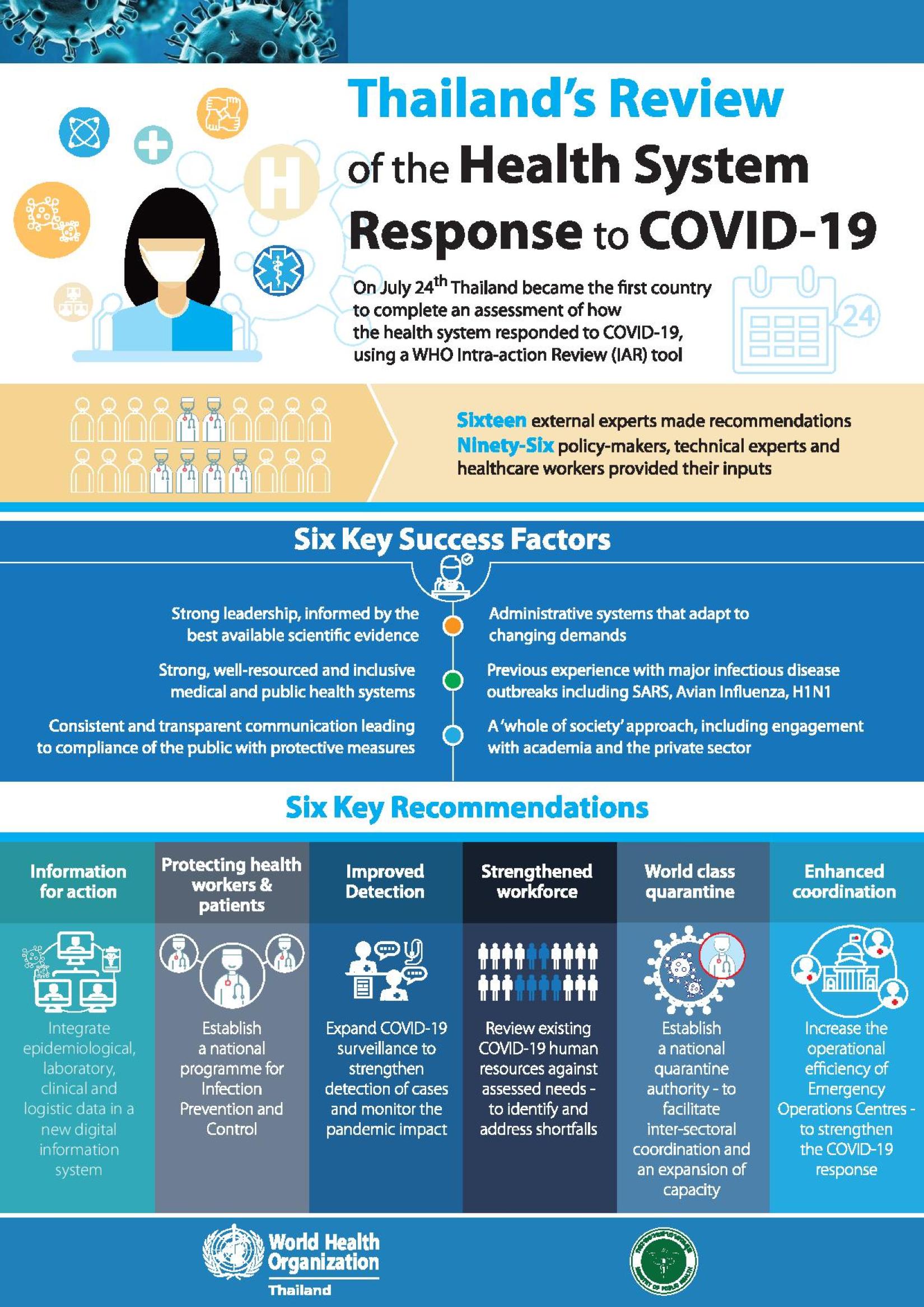The Ministry of Public Health and the World Health Organization Review Thailand’s COVID-19 Response
14 October 2020
Thailand has become one of the first countries in the world to review how its health system has so far responded to COVID-19. This process, known as a Joint Intra-Action Review, had two goals - to identify what went well during the first 6 months of the pandemic in Thailand, and to recommend how the Ministry of Public Health could improve its response to future COVID-19 outbreaks.

About the review
The Joint Intra-Action Review (IAR), conducted in July, was a collaboration between the Ministry of Public Health (MoPH) and the WHO to identify key strengths and vulnerabilities of Thailand’s COVID-19 response. It was done using a new WHO tool for country intra-action reviews.
The review report highlights important success factors and provides recommendations across nine important areas, or “pillars” of any country’s national response.
The Intra Action Review was conducted by sixteen reviewers from diverse backgrounds and included experts from WHO and other UN Agencies, the United States Centers for Disease Control and Prevention (CDC), and academia. The reviewers were independent; none were directly involved in the MoPH response.
Between July 20-24, the reviewers interviewed 96 Thai policy makers, technical experts and responders to gather information and insight. They then made their recommendations based on consensus.
The IAR highlights some of the factors that have allowed Thailand to successfully control COVID-19 so far: these include strong leadership that responds to best scientific evidence; a strong underlying strong public health system, the countries previous experience with other important outbreaks, and a strong collaboration with the academic and private sectors.
The reviewers also agreed on recommendations about what could be improved in the Ministry of Health’s response. The most important are provide in the background below.
”The review’s recommendations focus on enhancing coordination, improving surveillance and data systems for COVID-19, and strengthening and protecting the health workforce. Addressing these recommendations quickly will ensure an even more effective response to future waves of COVID-19 in Thailand,” said Dr Daniel Kertesz, WHO Representative to Thailand
While the primary intention of the IAR was to strengthen Thailand’s national COVID-19 response, for other countries, the findings offer useful information to support their efforts to control the pandemic.
“This review is not only important for the country, but for the WHO South-East Asia Region and beyond, as countries across the world are learning while responding to the pandemic” said Dr Poonam Khetrapal Singh, Regional Director, WHO South-East Asia
Noting the review’s results, H.E. Anutin Charnvirakul, Deputy Prime Minister and Minister of Public Health added, “I’d like to ask everyone to remain vigilant and practice the basic measures recommended by the Ministry of Public Health, whether it is wearing a mask in public places, keeping a distance, avoiding crowded or closed spaces where possible, washing hands regularly, and always registering on “Thai Chana” every time they visit places.”
Going forward, the Thailand MOPH and WHO Thailand will work together with partners to implement the key recommendations from the IAR.
Background: Key Findings
The Intra-Action Review highlighted factors that contributed to successful management of the pandemic in Thailand
- Strong leadership informed by the best available scientific evidence
- Administrative systems adapted to changing demands
- A strong, well-resourced and inclusive medical and public health system. This includes early and effective management of patients in hospitals and a strong capacity to trace and quarantine contacts using Rapid Response Teams and Village Health Volunteers
- Previous experience with major infectious disease outbreaks including SARS, Avian Influenza, and Influenza H1N1
- Starting entry screening early led to detection of the first case outside China. This allowed authorities to educate hospital and public health workers, and members of the public to the threat
- Cultural norms including non-contact greeting and mask wearing, supported by consistent and transparent communication improved public compliance with protective measures
- Early adoption of a ‘whole of society’ approach included active engagement with academia and the private sector
The Intra-Action Review also made recommendations to strengthen Thailand’s response to COVID-19. There were 25 recommendations overall – some of the most important include:
- Information for action: Key epidemiological, laboratory, clinical and logistic data needed to inform decision making need to be readily available. A new national digital data system would integrate data that could be easily accessed, analyzed and communicated.
- Protecting health workers: Infection Prevention and Control (IPC) capacities are generally strong at the healthcare facility level. However, establishing a national IPC programme with clear responsibilities, predictable budget, and dedicated staff could support transformative improvements. These include setting IPC policy, issuing uniform guidance, establishing training and credentialing standards, overseeing national laboratory-based Healthcare Associated Infection (HAI) surveillance and auditing IPC practices.
- Detecting cases:An enhanced COVID-19 surveillance system should be established and sustained to detect individual cases and small clusters. Routine testing of all patients meeting standardized case definitions in designated sentinel healthcare facilities would provide an early-warning system for community transmission, help to monitor the pandemic’s impact, and support the introduction of an eventual vaccine.
- Strengthened workforce: A national human resource mapping and planning effort would help to match human resources with assessed needs in every province. Close collaboration with academic institutions could address human resource shortfalls and strengthen surge capacities.
- World Class quarantine: Establishing a national quarantine authority would ensure coordination between the Ministries of Public Health, Interior, and Defence and maintain high standards, consistent implementation of policies
- Enhanced coordination: Developing a ‘concept of operations’ for Public Health Emergency Operations Centres (EOC) with established and tested standard operating procedures will improve operational efficiency between EOCs at the national and sub-national levels, and strengthen collaboration with other Ministries, including the Ministry of Interior’s Department of Disaster Prevention and Mitigation.

